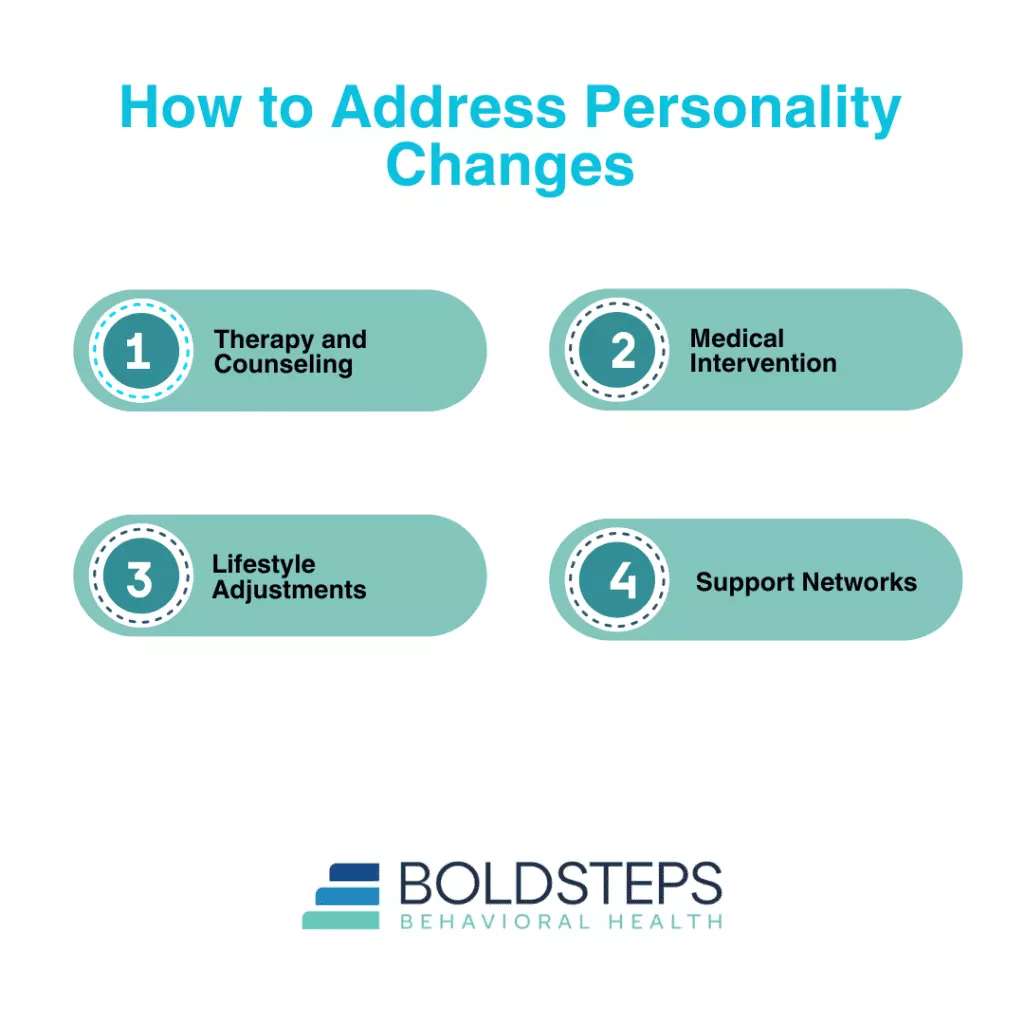Adderall can also lead to significant personality changes, especially when misused or taken in higher doses than prescribed. Understanding these potential side effects is crucial, particularly for those seeking help from addiction treatment centers in Harrisburg, PA, or exploring options such as intensive outpatient programs and mental health treatment.
What Are Personality Changes?
Personality changes refer to significant shifts in how an individual thinks, feels, and behaves over time. These changes can manifest in various ways, including alterations in mood, behavior, social interactions, and attitudes toward life. While some changes are a natural part of aging and growth, others may signal a deeper issue.
Examples of personality changes include:
- A once outgoing and sociable person becoming withdrawn or irritable.
- A typically calm individual exhibiting frequent anger or mood swings.
- Shifts in values or beliefs that were previously central to the person’s identity.
- Uncharacteristic risky or impulsive behavior.
Understanding Adderall and Its Impact on the Brain
Adderall is a stimulant that affects the central nervous system by increasing the levels of dopamine and norepinephrine in the brain. These chemicals are essential for regulating attention, motivation, and mood. While the intended effect of Adderall is to improve concentration and reduce impulsivity in individuals with ADHD, it can also alter behavior and personality, sometimes in unexpected ways.
For individuals who take Adderall as prescribed, these changes are usually subtle and manageable. However, when the drug is misused—often by those without ADHD or by individuals who take more than the recommended dose—the personality changes can be dramatic and concerning.
Common Causes of Personality Changes
Personality changes can be influenced by a wide range of factors, including health conditions, life events, and environmental influences. Some common causes include:
1. Mental Health Conditions
- Depression: Individuals with depression may experience a shift in mood, motivation, and outlook. They might become more withdrawn, pessimistic, or irritable.
- Anxiety Disorders: People with anxiety may become more cautious, fearful, or avoidant in their interactions and decisions.
- Personality Disorders: Conditions like Borderline Personality Disorder or Narcissistic Personality Disorder can result in extreme and unstable personality traits.
2. Neurological Conditions
- Brain Injuries or Trauma: A traumatic brain injury (TBI) can cause significant changes in personality, as damage to certain parts of the brain may alter behavior and emotional regulation.
- Dementia and Alzheimer’s Disease: These degenerative conditions can cause memory loss, confusion, and changes in mood and behavior.
- Stroke: Damage from a stroke can result in emotional changes, such as increased irritability or emotional instability.
3. Life Events and Stress
- Trauma: Experiencing a traumatic event such as abuse, loss, or a life-threatening situation can lead to lasting changes in personality.
- Chronic Stress: Prolonged exposure to stress can cause people to become more anxious, withdrawn, or irritable, affecting their personality.
- Major Life Changes: Events like a job loss, moving, or the end of a significant relationship can bring about personality shifts as individuals adapt to new circumstances.
4. Substance Abuse
- Alcohol or Drug Use: Substance abuse can significantly alter a person’s mood, behavior, and personality. Over time, addiction can lead to personality changes such as aggression, impulsivity, and apathy.
- Withdrawal: Withdrawal from substances can also affect a person’s mental and emotional state, leading to temporary personality shifts.
Signs of Concerning Personality Changes
Not all personality changes are alarming, but certain signs may indicate the need for professional evaluation. Some concerning signs include:
- Sudden, drastic changes in behavior that are out of character.
- Unexplained mood swings or shifts in emotional reactions.
- Increased isolation or avoiding social interactions.
- Irritability or aggression toward others.
- Difficulty concentrating or making decisions.
- Disinterest in previously enjoyed activities.
Common Personality Changes Associated with Adderall
- Increased Irritability and Aggression: One of the most frequently reported personality changes in individuals taking Adderall is heightened irritability or aggression. The stimulant nature of the drug can lead to mood swings, restlessness, and short tempers. This can be particularly distressing for friends and family members who may feel like they are dealing with a completely different person.
- Obsessive or Compulsive Behavior: Adderall can amplify focus to the point where individuals become fixated on specific tasks or thoughts, sometimes leading to obsessive or compulsive behaviors. This can be particularly problematic in social or work environments where flexibility and adaptability are required.
- Emotional Blunting or Detachment: Another common side effect is emotional blunting, where individuals feel disconnected from their emotions or experience a dulling of their usual feelings. This can lead to difficulties in personal relationships, as the person may seem distant, apathetic, or unemotional.
- Increased Anxiety and Paranoia: The overstimulation of the brain can trigger heightened levels of anxiety or even paranoia. Users might start feeling excessively worried, suspicious of others, or have a constant sense of impending doom, making everyday interactions stressful and overwhelming.
- Euphoric Mood Swings: Adderall can also cause mood swings ranging from intense euphoria to sudden crashes. While the initial high can feel pleasant, the subsequent lows can be severe, contributing to a cycle of dependence as users chase the initial feelings of energy and happiness.
Long-Term Risks and the Need for Treatment
The long-term misuse of Adderall can exacerbate these personality changes, leading to a more permanent shift in how a person interacts with the world around them. Over time, the brain becomes dependent on the artificial boost of neurotransmitters, making it difficult to feel normal without the drug. This can result in a vicious cycle of abuse, as individuals continually seek the drug to function or feel “normal.”
For those experiencing these issues, seeking help from an addiction treatment center in Harrisburg, PA, can be a life-changing step. Addiction treatment programs tailored to stimulant abuse often include a combination of medical detox, behavioral therapy, and mental health treatment to address both the physical and psychological aspects of addiction.
How to Address Personality Changes
Addressing personality changes depends on understanding the underlying causes. A comprehensive evaluation by a healthcare professional can help determine whether the changes are related to mental health, neurological, or situational factors. Common approaches include:
- Therapy and Counseling: Cognitive Behavioral Therapy (CBT) and other therapeutic approaches can help individuals understand and manage changes in their thoughts and behavior. Therapy provides a safe space to explore emotions, develop coping strategies, and regain stability.
- Medical Intervention: If a personality change is due to a neurological condition, brain injury, or dementia, medical treatment may be necessary. Medications, rehabilitation, and cognitive therapy can support recovery and emotional balance.
- Lifestyle Adjustments: Reducing stress, engaging in regular exercise, and maintaining a healthy diet can help improve mood and emotional regulation. Finding ways to manage daily stressors can prevent personality shifts caused by chronic stress.
- Support Networks: Connecting with family, friends, or support groups can provide encouragement and understanding during times of change. A solid support system can offer perspective and help people manage emotional fluctuations.
Options for Treatment: Finding the Right Fit
- Intensive Outpatient Program (IOP): IOPs are highly structured programs that allow individuals to receive intensive addiction and mental health treatment while maintaining their daily responsibilities. These programs offer therapy sessions multiple times a week, providing a strong support network without requiring a residential stay.
- Outpatient Treatment Program: Outpatient treatment programs offer more flexibility, typically involving weekly therapy sessions that focus on coping strategies, managing triggers, and rebuilding relationships affected by Adderall abuse. This option is ideal for individuals with mild to moderate addiction who have a supportive home environment.
- Mental Health Treatment: Because Adderall abuse often coexists with mental health issues like anxiety or depression, comprehensive treatment approaches that address both substance use and mental health are essential. Integrated care ensures that all underlying issues are treated simultaneously, leading to better long-term outcomes.
Conclusion
Adderall can be a beneficial medication for those with ADHD when used correctly, but it also has the potential to significantly alter a person’s personality, especially when misused. Recognizing these changes early and seeking appropriate help from an addiction treatment center can prevent further harm. Whether it’s through an intensive outpatient program, outpatient treatment program, or focused mental health treatment, recovery is possible. If you or someone you love is struggling, don’t hesitate to reach out Bold Steps at (717) 896-1880 for the support and guidance needed to reclaim control over your life.
FAQs: Everything You Need to Know About Personality Changes
Can personality change over time?
Yes, it’s common for people’s personalities to change over time. As we age, we may experience changes in our attitudes, values, and behaviors. Additionally, life events, such as starting a new job, getting married, or becoming a parent, can also influence our personality development.
When should I be concerned about personality changes?
If you or someone you know is experiencing sudden or significant changes in personality that are causing distress or interfering with daily life, it’s important to seek professional help. These changes could be a sign of an underlying medical or mental health condition.
What can a doctor do to help with personality changes?
A doctor can help diagnose the underlying cause of personality changes and recommend appropriate treatment. This may involve medication, therapy, or a combination of both.
How can mental health conditions affect personality?
Mental health conditions can significantly impact personality. For example, depression can lead to withdrawal, sadness, and loss of interest in activities. Anxiety can cause irritability, restlessness, and excessive worry. Bipolar disorder can lead to mood swings, including periods of mania and depression.
Can personality changes be a sign of a developing mental health condition?
Yes, personality changes can sometimes be a sign of a developing mental health condition. If you notice significant changes in your personality or behavior, it’s important to seek professional help.





